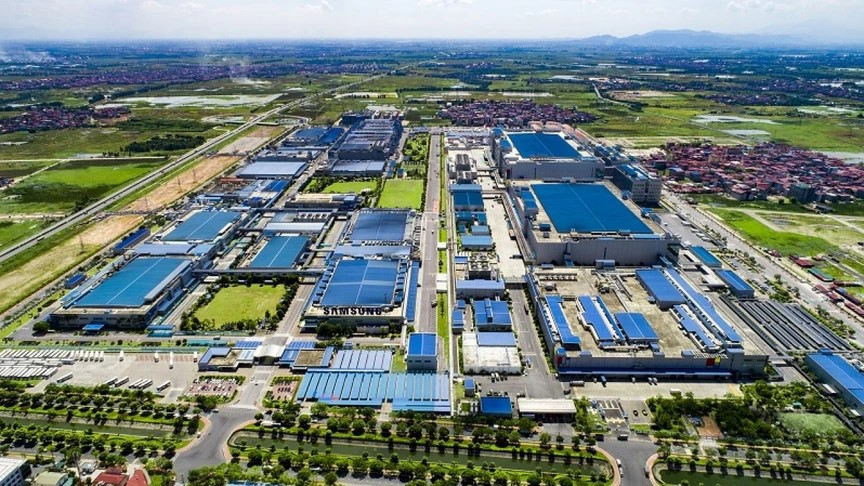In response to the concerns of businesses, the Ministry of Finance has stated that it will upgrade incentives for enterprises. Meanwhile, economic experts believe that the global minimum tax will not diminish the attractiveness of Vietnam's industrial zones in competing for FDI.
In response to the concerns of businesses, the Ministry of Finance has stated that it will upgrade incentives for enterprises. Meanwhile, economic experts believe that the global minimum tax will not diminish the attractiveness of Vietnam's industrial zones in competing for FDI.
The industrial real estate sector still has spare ground for growth
The Vietnamese economy is poised to enter the final month of the third quarter of 2024 with numerous positive indicators. Foreign Direct Investment (FDI) inflows stand out as one of the brightest spots in the overall market. According to data from the General Statistics Office (Ministry of Planning and Investment), as of July 20th, the country had 1,816 new projects granted foreign investment registration certificates, with a total registered capital of USD 10,763.9 million. This represents an 11.6% increase in the number of projects and a 35.6% increase in registered capital compared to the same period in 2023 (the same period last year had 1,627 projects with a registered capital of USD 7,935.1 million). Implemented FDI reached USD 12.55 billion, an 8.4% increase compared to the same period last year - the highest implementation level for the first seven months in the 2020-2024 period.
Mr. Nguyen Ba Hung, the Chief Economist for Vietnam at the Asian Development Bank (ADB), commented: "Vietnam is maintaining a good pace of attracting FDI amidst a global decline and a trend of decreasing capital flows into developing countries".
Along with maintaining its attractiveness in attracting investment, Vietnam has also welcomed a series of new industrial projects from North to South. Since the beginning of the year, numerous projects worth billions of dollars have been approved for investment, such as the Tho Hoang Industrial Park in Hung Yen (total capital of VND 3,095 billion), the expanded Phuc Long Industrial Park in Long An (VND 5,642 billion), the Hiep Thanh Industrial Park - Phase 1 in Tay Ninh (VND 2,350 billion), the Song Cong II Industrial Park - Phase 2 in Thai Nguyen (VND 3,985 billion), and the Dong Anh Industrial Park in Hanoi (VND 6,338 billion),etc.
In an exchange with Reatimes, economic expert - Assoc. Prof. Dr. Dinh Trong Thinh forecasts:"The industrial real estate sector will continue to grow in the coming period. Numerous large industrial parks have continuously received investment approvals in recent times, serving as a necessary requirement to enhance infrastructure and anticipate the development of both domestic and foreign enterprises".

Assoc. Prof. Dr. Dinh Trong Thinh. (Photo: Reatimes)
The expert explains that the economy is gradually recovering and developing, with improved social interaction, enhanced import and export of goods, and increased investment capital, attracting more international investors to Vietnam, leading to increased demand for industrial parks and export processing zones. Domestically, local businesses also desire investment to generate profitable business operations in the context of a promising economic growth outlook.
Earlier in the first quarter of 2024, when providing a forecast on the outlook for the industrial real estate market this year, MB Securities Joint Stock Company (MBS) stated that our country possesses certain competitive advantages.
Firstly, Vietnam remains a favoured destination for manufacturing capital flows following the "China + 1" strategy. During the period from 2022 to 2025, numerous vital transportation infrastructure projects connecting provinces, cities, and economic zones have been approved and rapidly commenced, creating a driving force for economic growth. Prime examples include the Northern Belt Road 4, Ho Chi Minh City Belt Road 3, North-South Expressway, Ben Luc - Long Thanh Expressway currently under construction, Cat Lai Port, and Cai Mep - Thi Vai Port.
Secondly, elevating the comprehensive strategic partnership with the US will be a factor that helps boost investment attraction. Each year, American businesses invest approximately 200-300 billion USD overseas, however, US FDI into Vietnam in recent years has only been around 1 billion USD annually. After upgrading the partnership with the US to a comprehensive strategic partnership, US FDI flows into Vietnam are expected to increase significantly.
Challenges loom, but "chances bloom"
Although assessed as robustly developing with spare ground for growth, experts believe that Vietnam's industrial real estate market still faces numerous challenges. From the perspective of the MBS analysis team, Vietnam needs to enhance its competitiveness in attracting FDI compared to other countries in the region, especially with nations like India and Indonesia. The risk of power shortages for production during peak seasons could also lead some investors to cancel their investment plans in Vietnam.
In particular, the Global Minimum Tax (GMT) is anticipated to bring about certain impacts. Specifically, Vietnam has issued a resolution to officially implement a 15% global minimum tax on multinational enterprises from January 1, 2024. Consequently, companies with revenue exceeding 750 million Euros that are currently enjoying incentives from Vietnam's investment attraction policies will have to pay a supplementary tax to reach the 15% global minimum tax rate.

The global minimum tax might slow down FDI inflows, but on the other hand, if procedures are simplified, comprehensive, and ensure the rights of businesses, it can still attract investors. (Illustrative image)
According to MBS, Vietnam's tax incentives (tax exemptions and reductions) will lose their effectiveness. The implementation of the global minimum tax will also affect large-scale investment flows, reducing Vietnam's competitive position in attracting investment. It will impact the strategy of attracting investment to develop advanced and high technologies, as investors and industrial real estate developers all leverage Vietnam's tax incentives to attract foreign enterprises as tenants.
Therefore, the GMT could potentially slow down FDI inflows, and reduce the attractiveness and competitiveness of the business investment environment, thereby indirectly impacting the industrial real estate market. This is particularly true in high-tech industrial sectors that the government is targeting, such as chip manufacturing, semiconductors, and electric vehicles.
Offering a different perspective on the GMT, Assoc. Prof. Dr. Dinh Trong Thinh analyzes: On the one hand, the global minimum tax necessitates a change in investment activities. Previously, we relied on tax incentives and considered them a "lifeline" to attract foreign investment. However, in reality, foreign-invested enterprises, when consulted, have stated that tax incentives are not the top criterion or the main issue they are overly concerned about when deciding whether to invest in a country. Instead, they primarily pay attention to the investment environment. Procedures need to be simple, and comprehensive, and ensure the rights of businesses. If they find it satisfactory, investors will make their decision.
On the other hand, the 15% tax rate applies to all countries, which could even be more advantageous for Vietnam. Moreover, there are countries known as tax havens, where Vietnam's tax incentives cannot compete.
"The GMT is an opportunity for Vietnam to increase its revenue as investors will have to pay a minimum tax of 15%. The new regulation will enable us to improve infrastructure and provide incentives to businesses in other ways", shared Mr Thinh.
Currently, the General Department of Taxation has been assigned by the Government to draft a Decree detailing Resolution No. 107/2023/QH15 on the implementation of supplementary corporate income tax following global base erosion and profit shifting (BEPS) regulations. It is expected that the draft Decree will be revised and finalized for submission to the Government in September 2024, and the Decree will be issued in October 2024./.


















